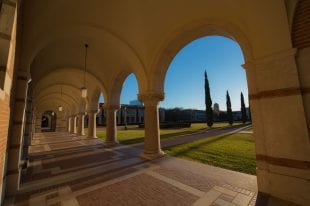Most Rice students have moved off campus for the rest of the semester due to the COVID-19 outbreak, and for many of them that means a move far away from Houston. So how does one of the most popular buildings on campus serve them from afar?
The Student Center has moved online, employing Zoom and other virtual spaces in much the same way Rice professors and rec center classes have quickly transitioned to the web.
“Students can still interact with our office, virtually,” said Kristen Ernst, associate director for student engagement.
“They can still request consultations, they can still email us with questions at sactclubs@rice.edu; we're still here to serve them.”
Ernst has been busy helping the Student Association (SA) conduct government proceedings online during what is already one of its busiest times of the year: the changeover between the outgoing and incoming senate. Rice’s newly elected SA senate officially takes office March 30.
“They're not letting the fact that campus is virtual right now impact them still trying to create community and to continue to serve students,” Ernst said.
There’s still the yearly retreat that must be planned for the new SA members; it’s going online this year, though students are trying to compensate for time zone issues and the general discomfort of sitting in front of a computer for five hours. The current plan? Spread the five-hour “retreat” across two days.
“They've been really great, and are just taking a lot of time to be intentional and thoughtful about how to engage people while they are virtual,” Ernst said.
Kate Abad, director of the Student Center, credits outgoing SA president Grace Wickerson and incoming SA president Anna Margaret Clyburn for investing much of their time working together to ensure a smooth transition. When the COVID-19 outbreak forced a change, both students quickly shifted gears.
“The Graduate Student Association (GSA) has also actively been a part of the COVID conversations in the crisis management team meetings,” Abad said.
“They have been sitting in on those meetings to make sure that the graduate student lens is being considered.”
Abad has also been assisting GSA, which serves a unique dual role as student government and programming arm for the vibrant Rice grad student community.
As the GSA also transitions its own elected officials, it’s also trying to make sure popular annual events such as Root Beer Cart, the Mario Kart party preceding Beer Bike, are translated to fit a virtual space.
Rice’s student-run businesses — Coffeehouse, Rice Bikes and The Hoot — are perhaps most drastically affected by the closure of the Student Center, said associate director Korista Lewis.
“They really needed extra support because they've never gone through anything like this before,” Lewis said.
“They're looking to us for stability — and that's been really helpful for me to remember in this upheaval. I’ve been trying to give them as much normalcy as I can.”
The three businesses run by Rice students employ 120 undergraduates, many of whom depend on those paychecks. The managers, Lewis said, have been working on virtual town halls and other online meetings to address this concern among others.
Amid it all, the Student Center team itself has been trying to keep its community together too.
They’ve planned to rebrand Popcorn Wednesdays to Zoom-in Wednesdays by inviting students to make their own popcorn for the weekly get-togethers. Video check-ins in the morning via Zoom also help, as does sticking to a schedule: The team recently completed an already-planned Sexual Assault Free Environment (SAFE) training.
As with most everything else at Rice right now, it was conducted online.




